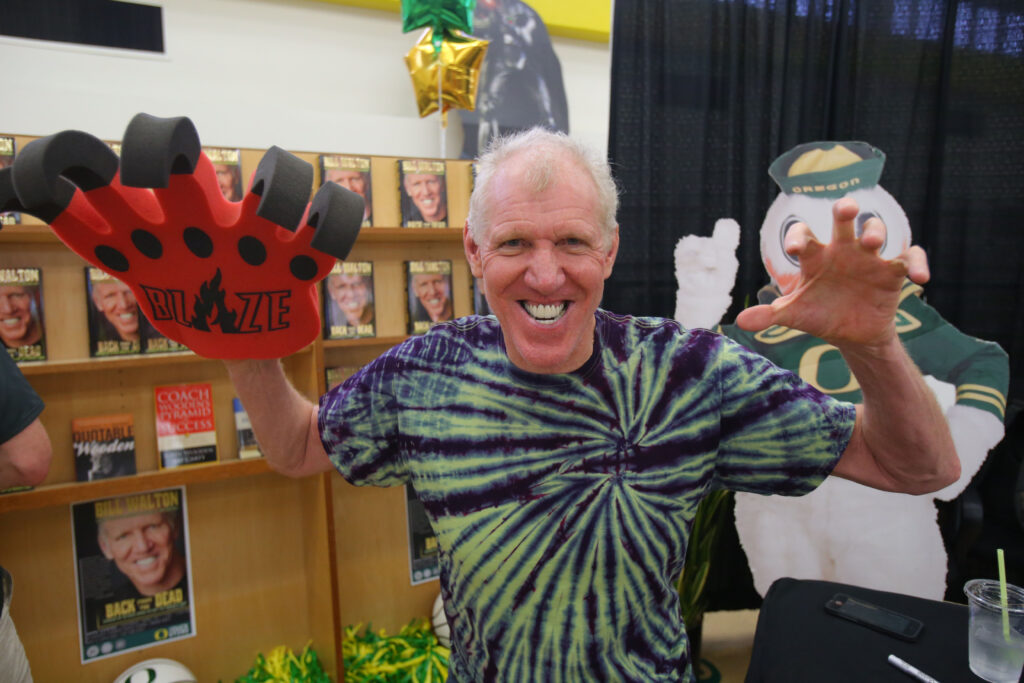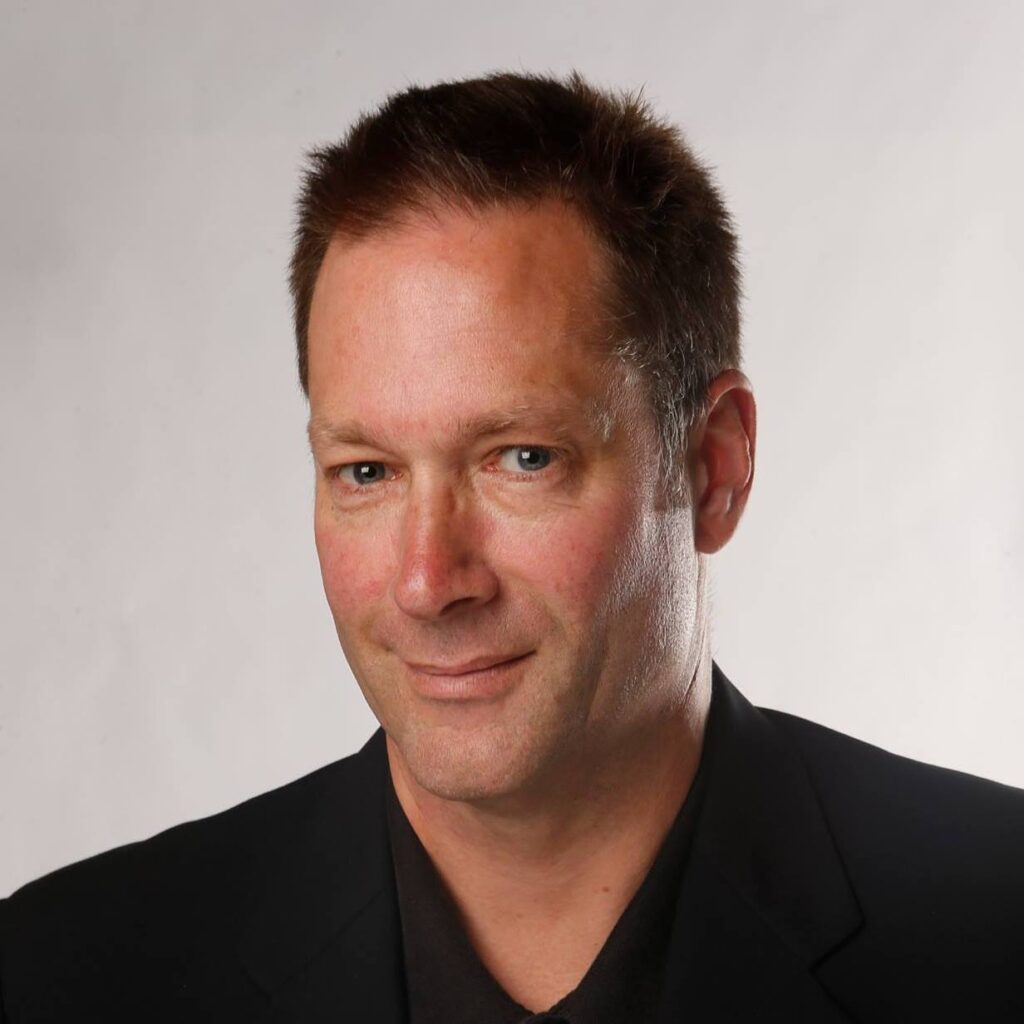Sometimes there are no words — but not for icon Bill Walton

You want to ask him just one last question, but William Theodore Walton III is a master of control.
“You’re best known these days as a basketball broadcaster, but … “
“I’m best known as Luke’s dad!” the 6-foot-11 man in a tie-dyed T-shirt, who is better known to millions of basketball and Grateful Dead fans as Bill Walton, interjects in a back room on the second floor of the University of Oregon Duck Store.
He is, of course, referring to one of his four sons, Luke Walton, who, like his father, is an ex-NBA player. But more importantly now, Dad is emphasizing, Luke is an assistant coach with the league-leading and record-setting (73 regular-season wins) Golden State Warriors, and that team’s first playoff game is in progress as we speak.
Down a hallway and out some glass doors, more than 100 Walton fans, some of whom have waited patiently for more than two hours, are growing restless in a line that snakes its way around bookshelves.
The book signing is supposed to have begun at 1 p.m., but Walton is a half-hour late for the 12:30 p.m. media availability – “Five minutes,” he says upon arriving, extending the giant digits on his giant hand – so we’ll need to make it quick.
But the Hall of Famer – who led the Portland Trail Blazers to their only NBA title in 1977, and who likes to talk, maybe more than anything during this long, strange trip that has been his 63 years on Earth – still is talking 20 minutes later.
“I’ve found myself rooting for Oregon and Notre Dame,” he’s saying. “And if anybody had told me that 42 years ago … I mean, come on.
“Mac Court and the Joyce Center (home of Notre Dame basketball)? And the Kamikaze Kids? It was awesome. … I love Oregon. What a spectacular day!”
He’s just not addressing the question, the one you never got to ask: What does he think of the haters?
Walton, who was at The Duck Store on Saturday to sign copies of his new memoir, “Back From the Dead: Searching for the Sound, Shining the Light, and Throwing It Down,” is perhaps the most polarizing sports broadcaster since the brilliant yet blustery Howard Cosell of “Monday Night Football” fame.
Walton is beloved. Walton is loathed.
“Because he drifts a lot of times from what’s going on (on the court),” says a man in his early 60s who doesn’t want to be identified about Walton’s broadcasting.
The man has come with his wife, who is getting a copy of Walton’s book, currently No. 17 on The New York Times’ best-seller list for hardcover nonfiction, signed for their son.
“If you’re not a counterculture ‘Deadhead,’ ” the man continues, “then a lot of his remarks aren’t as interesting as he thinks they are.”
Ouch.
Since recovering from major spinal surgery in 2009 – after enduring pain so bad he seriously thought about ending his life, Walton writes in his memoir – and reigniting his basketball broadcasting career in 2012 with the Pac-12 Network and ESPN, Walton has earned legions of devoted followers who love his psychedelic meanderings and hyperbolic comments.
Comments such as: “Beautiful basketball! The Ducks are on fire. … They have somehow come back and have found their way back to the Oregon Trail! Lewis and Clark would be so proud.”
There are maybe just as many, though, who reach for the remote when they hear his voice.
Google “Hate Bill Walton” …
“Hate UA announcer Bill Walton? There’s a petition for that.” It’s a link to a December 2014 story in The Arizona Daily Star of Tucson, home of the Arizona Wildcats, about an actual petition-gathering effort by UA fans in 2014 to ban him from announcing Wildcat games.
The “I Hate Bill Walton” Facebook page.
An si.com (Sports Illustrated) story titled, “Love him or hate him, Bill Walton stands out as an ESPN commentator.”
A Buzzfeed.com page titled “13 reasons why Bill Walton is the craziest announcer alive.”
That last one, though, is subtitled “The Hall of Fame hippie is calling Pac-12 games for ESPN this season, and that’s a beautiful thing.”
And that’s the thing about Walton.
To many, he is an irresistible personality, a modern-day “roundball” renaissance man who one broadcast partner, Jim Gray, describes this way in a recent New York Times Magazine article:
“He has such a fertile mind. He’s probably the only person who’s ever been able to tie together, in the same sentence, Mother Teresa, Michael Jordan, climate change, the Berlin Wall and – what’s that ballerina’s name? Baryshnikov.”
As insufferable as he can be for some, Walton also is warm and gracious and perhaps more full of life and gratitude than he’s ever been.
“I want to thank you all for coming out,” he says in his deep, inimitable voice after emerging through the glass doors and extending his long arms into the air and meeting the cheers with a yell of “Rip City!”
“We’ll be here until the last person is gone. So, don’t worry about me leaving early,” Walton tells them.
(He was true to his word, still there four hours later, signing one last book at 5:30 p.m.)
“I’m the last one out of here. And sorry I’m a little bit late, but we’ve been runnin’ all day, and been runnin’, really, since March 22, the day we launched (the book) … in midtown Manhattan.”
Grateful Dead music plays in the background. Everyone has a copy of the book in their arms, the one that begins:
I can’t do this anymore. It’s just too hard. It hurts too much. Why should I continue? What’s the point in going on? I have been down so long, I have no idea which way anywhere is anymore. There’s no reason to believe that tomorrow is going to be any better. If I had a gun, I would use it.
“This is a book for people who enjoy life,” Walton says. “This is for people who want to think. Who want to laugh, and who want to cry.
“There’s a lot of epiphanic moments in my life, in this book. I wrote the whole thing myself. I did the entire audio book myself.”
Walton tells the crowd how much he loves Oregon, where he used to play the Ducks and Beavers as a UCLA all-American, the nation’s top player three-straight years (1972-74), often in frustration.
Page 119: Mac Court in Eugene/Oregon-UCLA/January 1973:
As I tried to scramble back up and rejoin a game – no foul was called – some of the fans held me down so I couldn’t get up. One guy … kicked me in the lower back. … They showed the replay several times on TV during the rest of the game. It turned out that the guy worked for the Oregon Athletic Department – at least that day.
But Walton adores his memories of moving the following year to Oregon, the No. 1 draft pick of the Portland Trail Blazers in 1974, despite how it all ended, in injuries, lawsuits and recriminations.
“I came to Oregon 42 years ago, and I had no idea what I was doing,” he tells the line of people snaking around bookcases. It’s a line that remains more than 100 strong well into an hour of book signings and autographs.
“And each and everyone of you, around this entire state, the 33rd state of our great union, have always treated me with more kindness, with more generosity than I deserve.
“And I thank you for that. I thank you for giving me the life that I have. And I also thank you for your patience.”
And with that, he signs copies and stands for photographs, always flashing that big, toothy grin and a peace sign.
“I always loved him for his intellectual approach to sports and life as a whole,” says Stan Biles, 63, of Eugene, after he and wife, Janet, each gets signed copies. “He’s sort of a modern-day philosopher.
“And I love him as a broadcaster. We absolutely love him. And the Chamber of Commerce should put him on the payroll, because he’s the best ambassador the state of Oregon has.
“He’s the only announcer I know who knows the names of the Three Sisters – Hope, Faith and Charity.”
Janet Biles admits that one of her sisters will turn the television off or mute the sound when Walton comes on, but “I think he’s a hoot,” she says. “I think he’s great.”
John Benson, 54, a third-grade teacher at Eugene’s Edison Elementary School, agrees.
“You know, when he came out here and talked, it just showed what a kind and caring person he is,” says Benson, who was a 15-year-old high school student in Portland when the Blazers won the NBA title in ’77, after being second in line to get his book signed and autographs on some old Sports Illustrateds with Walton on the cover.
“I think he’s an ambassador for the Pac-12, and I don’t think they could have a better one.”

Mark Baker has been a journalist for the past 25 years. He’s currently the sports editor at The Jackson Hole News & Guide in Jackson, Wyo.
